Healing does not mean trauma or pain never existed, but they no longer have power or control over you – physically, emotionally, or spiritually. When the world is full of suffering, we must remind ourselves that the world is also full of overcoming it. Trauma happens, it is not our fault, but healing is our responsibility.
Right now humanity is being tested during the tragedy of COVID-19. The crisis is real. Not only the coronavirus is contagious in the physical realm, collectively, our mental, emotional and spiritual health is also challenged in a big way.
What is vicarious trauma and who can be affected by it
Vicarious trauma is secondary traumatic stress resulting from empathetic engagement with trauma survivors.
When policemen, doctors, nurses, therapists, coaches, journalists and volunteers assist and support trauma survivors, these front-line workers can experience, to a lesser degree, the same feelings faced by the trauma survivor in their care.
Due to the severity of the current pandemic, sadly so many selfless, courageous and brave healthcare workers who have lost their precious lives to support our world and they don’t even have a chance to look into vicarious trauma, let’s take a moment to thank them and show our respect.
It used to be that these care-givers and professional helpers are the direct groups who can be affected by vicarious trauma.
However, nowadays in the information age, due to technology, any readers, listeners and and observers, especially if you are sensitive towards energy, can also be the victim of vicarious trauma and experience secondary stress.
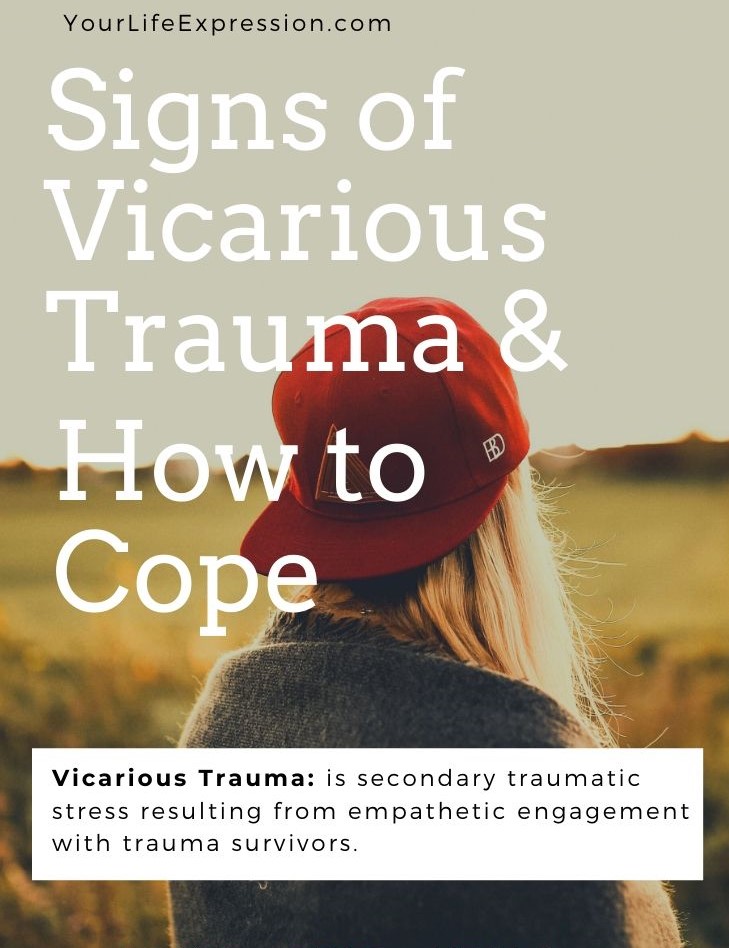
Signs of vicarious trauma
Vicarious trauma can impact someone emotionally, mentally, psychologically, spiritually, physically and cognitively. Although everyone can experience it differently, here are some common signs:
- You experience difficulty in sleeping or getting up and get usual stuff done on a day to day basis.
- You have digestive issues or suddenly lost your appetite.
- You feel consumed by long-lasting sadness, grief, phobias and anxiety.
- You feel or are told that “you are not being your normal self.”
- You feel or are told that “you’ve lost your sense of humour.”
- No matter how much effort you put in, you feel helpless.
- You experience mood swings without apparent or obvious reasons.
- You develop physical symptoms such as headaches, rashes or pains even if mild.
- You feel difficult to maintain boundaries and often over-extend yourself that leads to exhaustion.
- You start to feel numb and difficult to talk about your own feelings.
- Things you once enjoyed become diminished.
- You start to withdraw and isolate from others.
- You feel that you are suffering from compassion fatigue (see the next section for more details)
If you answer YES to more than four statements, you may be suffering from vicarious trauma.
As our external world is evolving and becoming more and more connected and complex, when a crisis happens, we hear and know about it.
The pain, fear, and terror that trauma survivors have endured should be witnessed and never be forgotten. Our compassion is always needed.
However, when we suffer from vicarious trauma, we cannot offer our best possible help. We must take our responsibility to prevent, recover and heal from vicarious trauma.
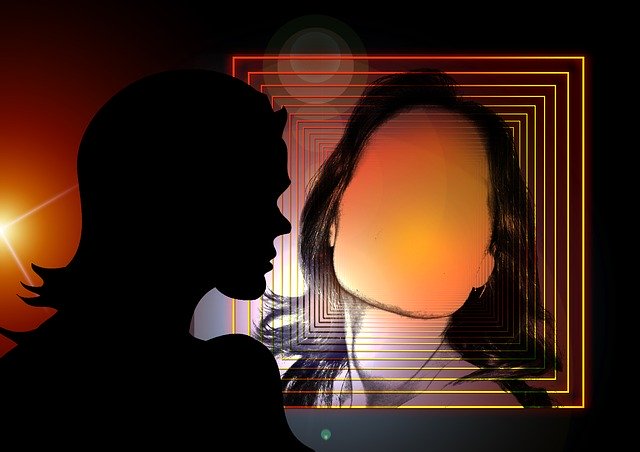
Differences amongst vicarious trauma, compassion fatigue and burnout
People often confuse vicarious trauma with burnout or compassion fatigue. All these three share similar symptoms and there are some overlaps.
Burnout is a wider-concept relatively speaking, it can impact anyone in any situation. For example, if you spend prolonged time to perform repetitive, tedious tasks. Over time, you’ll feel worn out.
Or even if you do something you greatly love, but you take on more than what your capacity allows (time, energy and resources), gradually you can develop burnout: feel stressed out, overwhelmed and tired.
Burnout is easily reversed when you rest, take regular breaks.
Compassion fatigue: you have too much compassion, for those who are directly suffering, that makes you tired and exhausted to an extent that you might not function very well in your daily life.
When the helper or the listen is unable to replenish or refuel themselves, there is profound pressure on their emotional and physical erosion health.
Some sources define compassion fatigue as when you’ve shared too much compassion and now have little left.
However, I have a different perspective. Compassion is not something finite that we must count carefully. However, too much compassion (infinite energy) can be overbearing for our body (finite) to handle, ie, too much compassion can be overwhelming, which can result in fatigue.
Compassion fatigue might give you burnout, but burnout can be caused by anything, including compassion fatigue.
Vicarious trauma, as we mentioned at the beginning of this article, is secondary traumatic stress resulting from empathetic engagement with trauma survivors.
Some institutions use vicarious trauma and compassion fatigue inter-changeably. However, my understanding is that vicarious trauma will unsettle your deepest values and change your world view, while compassion fatigue will not.
Stories we see, hear and/or experience ultimately shape our inner-world. When we are repeatedly exposed to traumatic materials, without being warned about vicarious trauma, our heart can shatter and soul flee.
A familiar world that we’ve always known suddenly collapses, then there in the abyss, anxiously and sometimes desperately, we are searching for the answer: Why does this happen? How much more darkness is out there?
And if you have your own history of trauma, this too can be triggered while you are witnessing someone else going through a very painful and challenging time.
Bear in mind, you can even develop vicarious trauma without having compassion fatigue or burnout.
For example, if you are a social worker helping a refugee family to go through a very challenging time and restart their life. During this process, you see first hand, how poorly they are actually treated. This shocks your system and you feel the injustice. You can still go on your life as normal on the surface, carry on working and meeting up with friends, however, when you are with others, you cannot open up and talk about what you have experienced from this case. Something deep down has been disturbed.
Burnout and compassion fatigue often can be part of the symptoms of vicarious trauma. However, vicarious trauma can occur without burnout or compassion fatigue.
Generally speaking, if not taken care of, all three can lead to serious problems such as depression, with compassion fatigue and vicarious trauma can cause C-PTSD (complex post trauma stress disorder).
In order to cope with our day to day challenges, many front-line workers tend to bury their feelings and “move on” to the next case, thinking they are strong enough to get through. But the pain and disturbance remains, often subconsciously.
How to prevent, recover or heal from vicarious trauma
Carrying a burden of terrible knowledge of the underbelly of life is never easy.
Many people who are suffering from vicarious trauma often feel disoriented and struggle to understand the roots of the pain.
And due to the “shell shock” and the shattering of their value system, it can also feel like going through a dark night of the soul.
If this is you, please understand that this is not your fault.
As difficult as it is, take this opportunity as an invitation to grow, with your roots becoming deeper, heart stronger, and eventually reach a new equilibrium and re-find that inner peace.
Self-care is essential to facilitate this transformation, with support from some professionals who understand what you are going through.
With today’s market eagerly commercialising self-care, the true meaning of self-care can also be easily misunderstood.
It is far beyond just being soft and pampering yourself, nor is it about ignoring the negative, but instead, embracing the truth and still finding ways to love the world.

Just like looking after your body during a physical illness, tending your soul is an essential part when you are going through vicarious trauma, especially if you have PTSD symptoms and are going through a dark night of the soul.
The pain can be very confusing, overwhelming and devastating. Yet self-care is not about bypassing darkness, but acknowledging those painful human experiences, once our Soul does feel acknowledged and witnessed, it has an amazing capacity to guide us to next part of the wild journey naturally.
Synchronicities then happen and spiritual equilibrium is restored.
Self-care helps to solidify us when we are at our most vulnerable moments, so that we have the assurance and safe space to explore, or even make mistakes, yet ultimately grow.
When going through vicarious trauma, self-care is a necessity, it can help us re-construct those parts that have been fragmented. It’s about harnessing awareness and self-rapport: knowing what you need & want, and communicate them truthfully and skilfully. Without such foundation, it will be too difficult to develop courage which is required for the growth of the Soul.
Self-care is a necessity, not a luxury; a priority, not a “just in case”.
It takes time, effort and ongoing commitment. Nevertheless, gradually you will be able to put those shattered pieces back together and be empowered by the whole experience.
Once you are out of the dark cocoon, you’ll be gifted by your precious experience, with more compassion to others (and yourself), gratitude towards life and more profound understanding of the world than before.
The wound is where light enters you.
Rumi
Right now with so much confusion and suffering in all corners of the world, many people are at risk of having vicarious trauma, even if you are not a front-line worker. It can creep in under the radar, and it is very easy to develop symptoms without knowing it. That’s why I want to write and share this article to raise awareness.
If you are new to the concept of vicarious trauma but feel that you might be affected and want to mitigate the risk, here are some recommendations:
- Have a set time to check news, social media and all kind of contradicting information. This is not to encourage you to bypass or ignore negativity. Rather, this will train your body and brain to get a rhythm, so that you can anticipate potential triggers and minimise your every day disruption.
- Talk to a senior relative or friend who is wise and has been through a lot in life. Be open-minded and listen to their views. Their simple yet sage words might just be exactly what you need to hear.
- Practise grounding meditation daily so that you can always find your centre even if you temporarily lose it.
- Develop a robust self-care routine. Some stability and predictability in your daily routine can be a bigger help than is often acknowledged.
- Make strengthening yourself as a priority, for example, everyday a quick mantra reminder of “I embody courage to walk my path” or “I am grounded and secure” can help you set the right kind of intention and mindset.
- Sharpen your self-awareness, for example, as soon as you notice you are experiencing any symptoms listed in the “signs of vicarious trauma” section, switch into your self-care mode such as deep breathing, practising spiritual renewing and simply asking yourself “How Am I?”
- Understand that while you should always try your best, it is not your responsibility alone to solve all the world’s problems.
- Reflect and examine on your boundaries, try not to over-extend yourself.
- Take time to engage with the world in a neutral or positive manner, it will help you re-establish a more balanced world view. There are many types of therapy you can try: writing, art, or body related.
- Build your own support system, watch out for each other.
- Observe Nature: how are patterns woven together? What is the cause and effect? Mama Nature has had it all and nothing will ever escape from her. She has the key to everything.
I hope that this article has given you a helpful overview on vicarious trauma, compassion fatigue and burnout, their similarities and differences, signs to watch out for, how you can stay centred and grounded.
It’s only when we are well in ourselves, can our compassion flow more freely and healthily.
The more aware you are, the more effectively you can look after yourself, as well as be supportive towards people who might suffer from vicarious trauma.
In developing the level of awareness necessary to care for ourselves and each other, we can better fulfil our potential and become the change we want to see.

Yiye Zhang


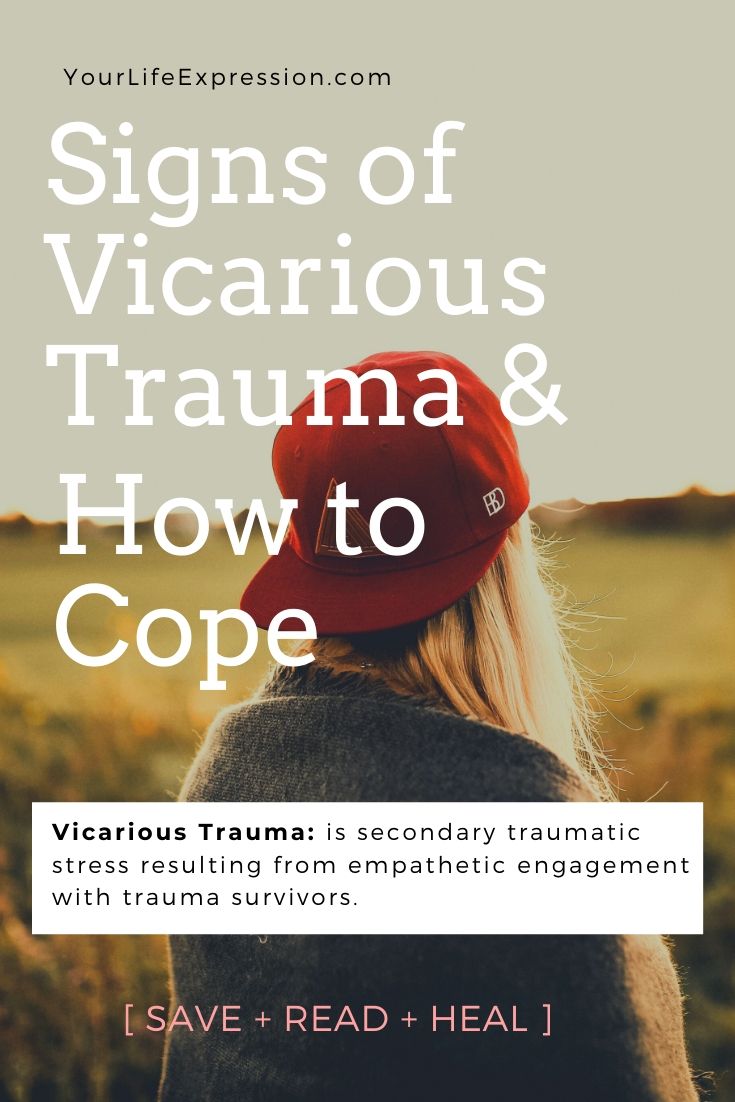
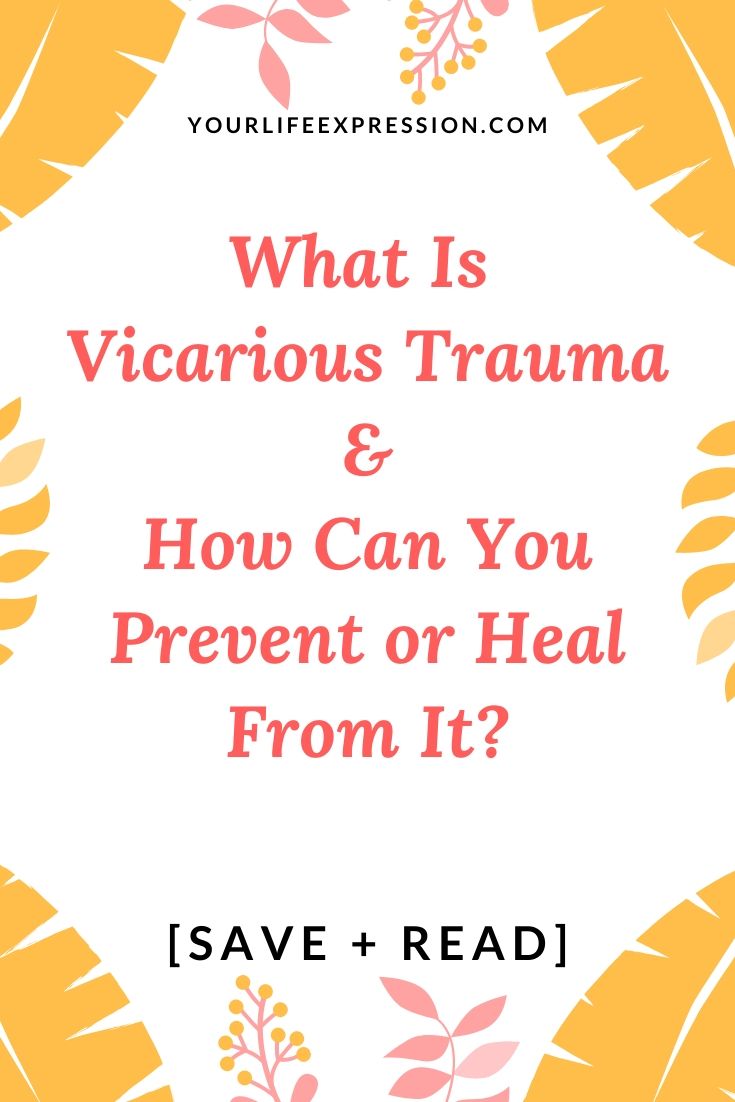
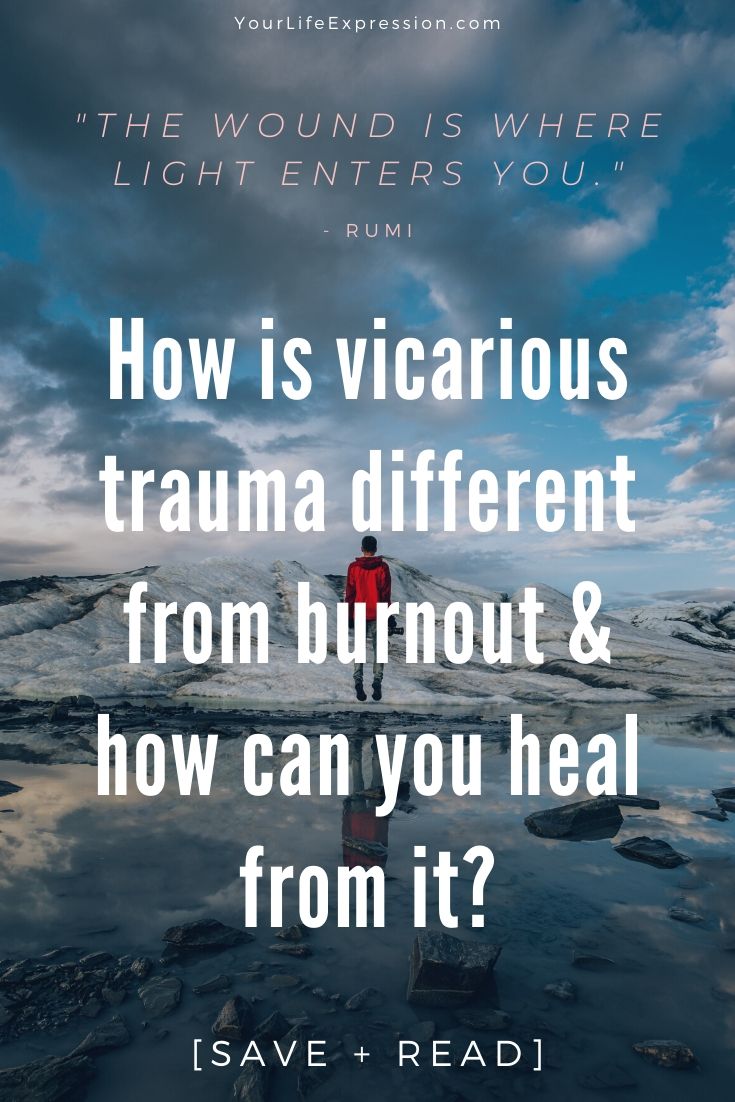
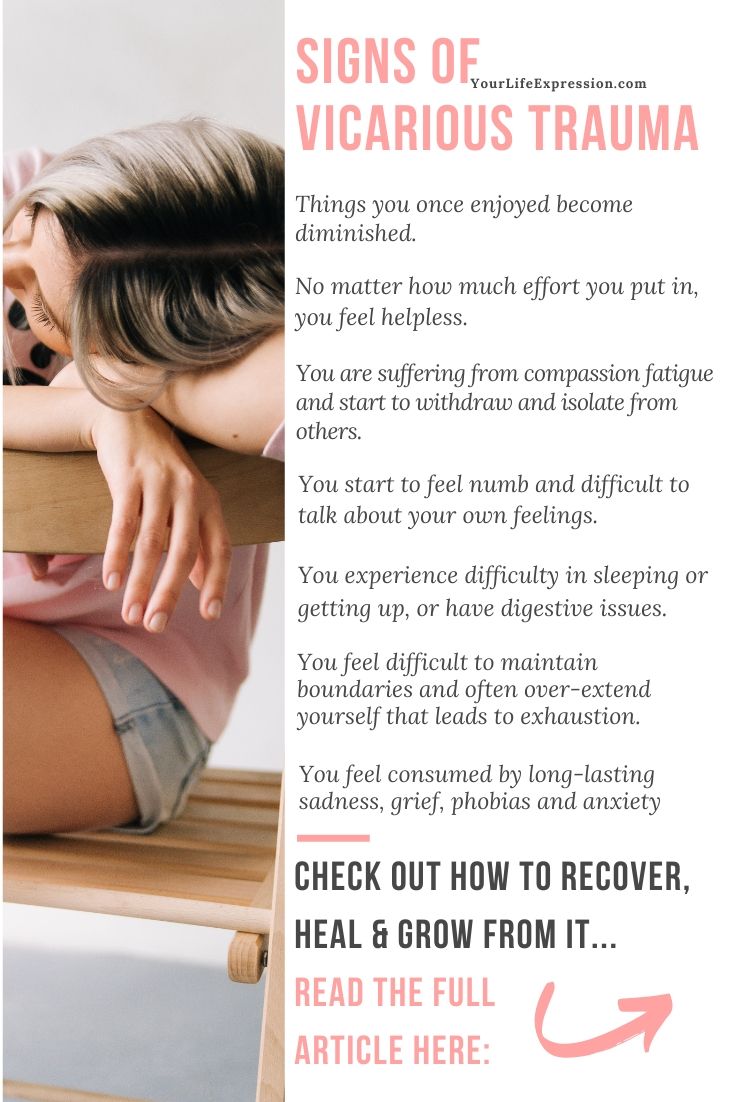

I find so many articles of yours very helpful, Yiye. I enjoy reading them and this one is especially relevant and helpful, thanks a lot for sharing!
Hi Grace, good to hear that this site and article is useful, thanks a lot for dropping by!! <3
Take good care!
I so glad I have come across this site thank you
Appreciate your message Elizabeth, take care!
This article is helping me a lot at the moment. I wish that I read it last year. Thanks a lot for your compassionate voice, Yiye! And I really appreciate the way you explain such a difficult and complex concept in a simple and elegant way for people like myself to understand and digest. I am sure that I am not the only one.
It certainly has been such a challenging time for many of us, I’m glad that you find this post helpful. Your support and encouragement means a lot to me, thanks so much Nigel!
Six years ago I married someone who is in prison and I experienced the vicarious trauma of learning his entire life history, which was horrific, and experiencing the reality of the prison system in America which is also horrific.
So I say this with love but this article is barely scratching the surface. Self-care can help you cope, but it doesn’t teach how to actually go through the transformation process that this kind of experience can bring. And too much emphasis on self-care can lead people to be on a constant treadmill of trying to avoid their “negative” feelings and prop up their old worldview, when what they actually need to do is embrace the process of their worldview being shattered.
Trauma up-ends your perception of what is “normal” because you realize what human beings are actually capable of, and the depth of suffering that exists that is caused by other people. That is a hugely eye-opening experience and you feel the shock viscerally. It is devastating. But as you grieve the bubble of innocence you used to have, and process the shock of this new awareness, you eventually become a person who is far more informed and aware of the entirety of the human experience. It is letting yourself go through that entire grief experience (“dark night of the soul” and letting your illusions fall away that leads to true resilience.
“Ignoring negativity” is bypassing, not self-care. Self-care can be as deep as you are willing to go and define. Although I disagree with discounting or diminishing spiritual self-care out of personal growth and transformation, I can see that you are very passionate about this topic and I appreciate you for sharing your expetiences and thoughts with honesty.
Best wishes to you and your husband.
This is so useful! A few friends and I have been feeling down in the past weeks, but we couldn’t put a finger on it, now I know why, I am sharing this with my friends! Self-care and self-awareness are our loyal tools!🙏
So glad it helps Rose, you and your friends take good care!
Hi Yiye, I’ve been following your blog and newsletter for a few years, what you share has always been so helpful and encouraging!⭐
I am a social worker and I resonate with this article a lot, I often feel tired and don’t even have energy for self-care lol! Maybe self-care should be a higher priority in my life. Thanks again!
Helena
Hey Helena, thank YOU for doing what you do!!
I hear you on self-care. You might find this mindset help – if we assess our energy level like our phone battery (how we always keep an eye on it, and if it is low, we’d charge it a.s.a.p. rather than waiting for it to be completely out), we too should “recharge ourselves” proactively by taking care of our physical, emotional and spiritual needs, instead of depleting ourselves, with no resources left for the essentials.
Having said that, due to circumstances, I completely understand that sometimes it is so tough for the front-line workers to think about themselves – you guys are the heroes!
Thanks again for connecting! It’s such an honour that my work could be of service xo